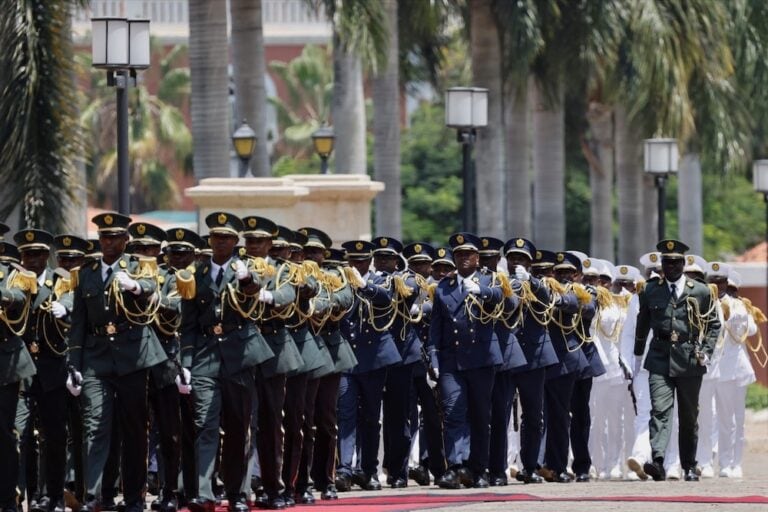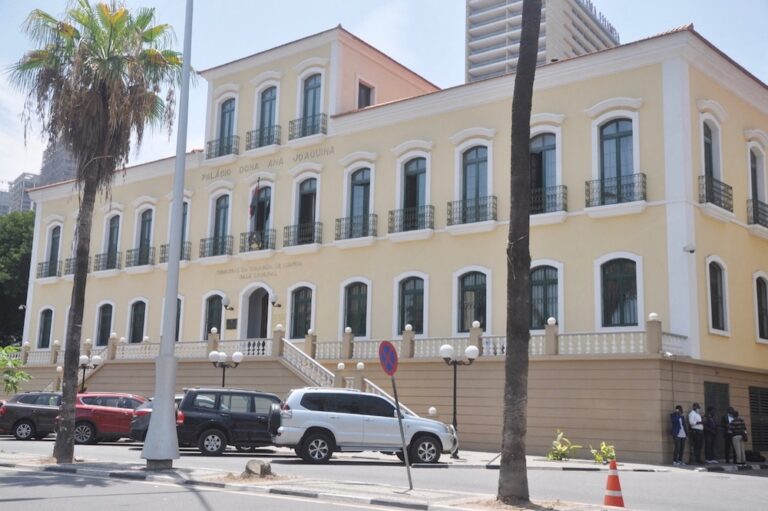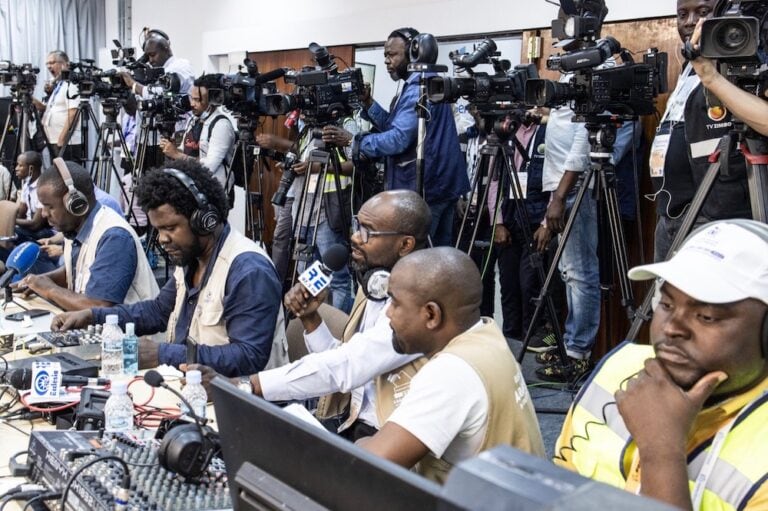(MISA/IFEX) – On 6 September 1999, the director of the bi-weekly “Folha 8”, William Tonet, was called in for questioning by agents of the Selective Crimes Section at the Criminal Investigation Police Department (DNIC) in Luanda. The interrogation was in connection with an article published in “Folha 8” several weeks ago about the 9 August […]
(MISA/IFEX) – On 6 September 1999, the director of the bi-weekly “Folha 8”,
William
Tonet, was called in for questioning by agents of the Selective Crimes
Section at the Criminal Investigation Police Department (DNIC) in Luanda.
The interrogation was in connection with an article published in “Folha 8”
several weeks ago about the 9 August raid on the church-owned Radio
Ecclesia.
**New cases and update to IFEX alerts of 7 September, 17 August, 13 August,
11 August and 10 August 1999**
Tonet told MISA-Angola that in the first part of the interrogation, police
questioned him about Padre (Father) Mateus, a priest quoted in the article,
and other sources of criticism who condemned the raid on Radio Ecclesia. In
the second part of the interrogation, the police asked Tonet to explain and
give interpretations of “suspicious and dubious articles and headlines”
published in the last edition of “Folha 8”. Tonet was held for just over
three hours.
On 8 September, two of the layout artists at “Folha 8”, whose names were not
immediately available, were interrogated at the same department in
connection with the article on Radio Ecclesia.
On 9 September, Tonet was again called in for questioning, this time in
connection with articles appearing in the 8 September edition of “Folha 8”.
In an interview with MISA-Angola, Tonet denounced the police, saying that
they had established a censorship bureau at DNIC to deal specifically with
“Folha 8”, and adding that the director, journalists and other personnel at
the newspaper could be called in for interrogation at any time. Tonet said
the campaign included the recruitment of informers and spies “to watch our
steps, inform about our sources and perform other shady assignments to
suffocate those who challenged the ruling power.” Tonet added that the
operation was being co-ordinated by the Selective Crimes Section, which was
regarded as an appendix of the state security unit created to deal with
special political matters and mentors of a brainwash programme to discourage
independent journalists from commenting on issues which did not favour the
government.
In another development, the IRIN news agency reported that on 8 September,
the government imposed a ban on the transmission of foreign news programmes.
As a result, the church-owned Radio Ecclesia suspended broadcasts of an
African news service from the Catholic Church in Portugal. The Ministry of
Communication reportedly informed the station that the daily news programme
from Lisbon could no longer be aired.
Meanwhile, further details have emerged about the detention and
interrogation of journalist Gilberto Neto on 3 September. MISA-Angola
reports that Neto was held in jail twice for several hours during a day-long
interrogation at DNIC in Luanda.
The journalist said he was taken to prison after he refused to confirm his
participation and reveal the sources quoted in the article published in
“Folha 8” about the 9 August raid on Radio Ecclesia.
Neto said that he told the police that he could not be held accountable for
the conduct of Radio Ecclesia, but the interrogation squad insisted that he
should be arrested as he “refused to collaborate with investigations and
resisted police orders.” The journalist said the police intended to confuse
him from the beginning by announcing that he would spend time in jail
regardless of the answers he gave.
Neto was first held in the cell between 12:00 p.m. and 3:00 p.m. (local
time). The second time, the police used force to drag the journalist into
the prison, and he was hit on the face with a piece of wood used for
identification pictures. He was held in the cell from 7:00 p.m. to 8:30
p.m.. The aggression occurred when several agents grabbed the journalist
from the back forcing him to hold the wooden slab and face the camera. The
journalist was released by 9:30 p.m.. “Then I realised that my lip was
bleeding and my shirt had been torn. I was terrified,” Neto told
MISA-Angola.
Background Information
Neto, who was again called in for questioning on 6 September, was one of at
least eight journalists in various parts of Angola who were interrogated by
authorities between 19 August and 8 September. In Malange, in the North
Eastern region, journalist Isaias Soares was detained for several hours on
19 August in connection with a story about the looting of humanitarian
assistance by government forces. On 23 August, in Kuito, in central Angola,
four journalists – Aniceto dos Santos, Albano Custodio, Florentino Setila
and Able Abraao – were questioned by DNIC in connection with military
reporting. In Luanda, the chief editor of Radio Ecclesia, Paulo Juliao, was
questioned for more than three hours on 30 August in connection with the
article on Radio Ecclesia which appeared in “Folha 8”.
The actions against the journalists point to a full-out campaign by the
government to discourage commentary and reporting on the civil war.
On 9 and 10 August, police held a total of four journalists from Radio
Ecclesia after the station re-broadcast an interview with UNITA rebel leader
Jonas Savimbi. Police also confiscated the material containing the
interview. Journalists Paulo Juliao, who is also the chief editor at the
station, Laurinda Tavares and Filipe Joaquim, were detained and questioned
for several hours on 9 August before being released on the same day. Juliao
was re-arrested on 10 August along with colleague Emanuel da Mata. The two
journalists were held for about nine hours before being released. Four other
journalists, British Broadcasting Corporation (BBC) correspondent Reginando
Silva, and Nelson Rosa, Manuel da Silva and Jose Maria, all from
state-television TPA, were also summoned for
questioning by DNIC on 10 August. The TPA apparently also broadcast the
contentious Savimbi interview, which was first broadcast on the BBC. The
four were questioned briefly before being released.
An earlier chronology of incidents affecting media workers in Angola since
January this year can found on the Internet at:
http://www.misanet.org/alerts/19990707.angola.0.html
Recommended Action
Send appeals to authorities:
workers in Angola
journalists, and pointing out that it is both a violation of the Angolan
Constitution and the fundamental human rights of media workers as enshrined
in international treaties to which Angola is a
signatory
a
result of detentions and interrogations, is contrary to a letter by Minister
Vaal Neto to the Committee to Protect Journalists in June in which he said
that “the state and the Government of the Republic of Angola have never
intended to harass any journalists or shut down the private media.” The
letter went on to say, “After more than a decade of
democracy, it has been shown that, even in war, the Government declared no
state of emergency or exceptional circumstance, and no journalist can be
found in any Angolan prisons who have justly or unjustly been condemned and
arrested for having published writings or reports.”
Appeals To
Hon Jose Eduardo dos Santos
President of the People’s Republic of Angola
Fax: +244 2 392 733/ 391 476/ 331 898Minister of Information
Mr Hendrick Vaal Neto
Fax: +244 2 343 495
Please copy appeals to the source if possible.


